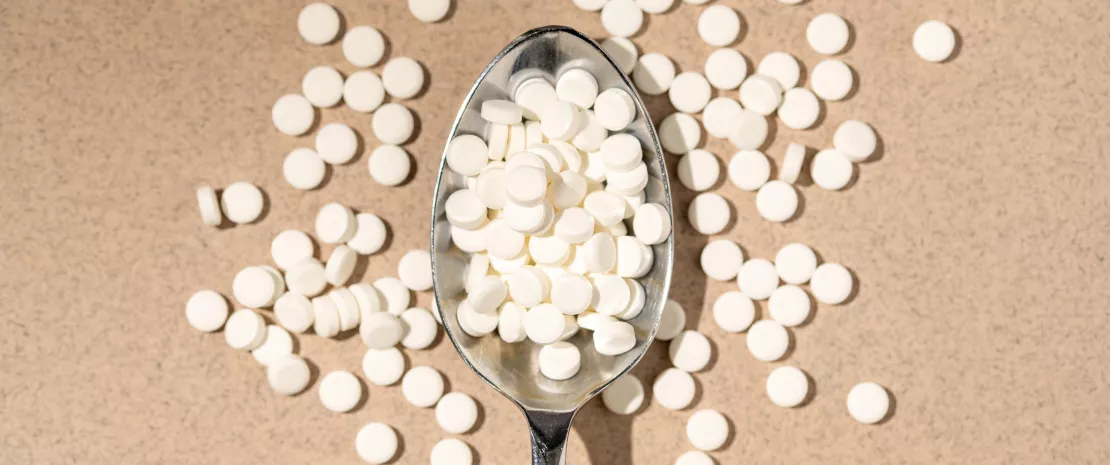Let’s not sugarcoat it: sweeteners decrease the effectiveness of immunotherapy
Sucralose is a widely consumed sweetener that alters gut microbiota, indirectly impacting the immune system via T cell metabolism, and with it, responses to immunotherapy.
Lay public section
Find here your dedicated section
Sources
This article is based on scientific information

About this article
The gut microbiota is a major regulator of responses to
(sidenote:
Immune checkpoint inhibitors (ICIs)
Therapies that seek to remove the mechanisms that inhibit the immune system’s response to cancer cells. Targeted checkpoints include Programmed Death-1 (PD-1), Programmed Death-Ligand 1 (PDL-1), and cytotoxic T-lymphocyte associated protein 4 (CTLA-4). Lifting these brakes allows the immune system to recognize and attack cancer cells.
)
in several cancers, including melanoma and non-small-cell lung cancer (NSCLC). However, the impact of dietary factors such as sweeteners remains poorly understood. For example, sucralose is a widely consumed sweetener known to alter the microbiota. Does it play a role? To answer this question, researchers studied the link between consumption of this sweetener and the effectiveness of anti-PD-1 treatments.
Diminished outlook among sweetener users
The analysis involved three patient cohorts: 91 patients with advanced melanoma, 41 with advanced NSCLC, and 25 with high-risk resectable melanoma, all treated with anti-PD-1 immunotherapy.
High sucralose consumption (> 0.16 mg/kg/day) is associated with poorer clinical outcomes:
- in advanced melanoma, median progression-free survival (PFS) decreases from 13 to 8 months
- in NSCLC, it falls from 18 to 7 months, with a lower treatment response rate (12% vs. 49%)
- in resectable melanoma, treatment response is lower, as is relapse-free survival (19 vs. 25 months).
Similar trends were observed with another sweetener, acesulfame, but not with aspartame or saccharin.
Underlying mechanisms involving T cells
Murine models have confirmed these findings and made it possible to explore the underlying mechanisms. Sucralose consumption leads to resistance to anti-PD-1 immunotherapy and significantly increased tumor growth, whereas sucrose (table sugar) consumption has no effect. The mechanisms appear to involve T cells: sucralose consumption has deleterious effects on several T cell processes (proliferation, cytotoxic function, metabolism). These effects do not appear to be limited to cancer alone, but instead may affect various diseases, from cancer to seasonal viral infections.
24-37% Nonnutritive sweeteners (NNS) intake is prevalent in the general population, both in lean and obese individuals alike, with 24% to 37% of US adults reporting some NNS intake in dietary recall surveys.
The gut microbiota, necessary and sufficient
The effect of sucralose depends entirely on the gut microbiota: fecal microbiota transplants (FMT) from mice that consume sucralose are sufficient to reduce the effectiveness of immunotherapy in naive mice. Conversely, an FMT from mice that respond to treatment restores the effectiveness of immunotherapy in mice that consume sucralose.
More specifically, sucralose alters microbiota composition, favoring bacteria that degrade arginine and thus reducing arginine levels in feces, serum, and tumors. Arginine is a key metabolite in T cell metabolism, which explains why T cells become depleted. Remarkably, supplementation with arginine or citrulline (a precursor of arginine) restores T-cell function and overcomes sucralose-induced resistance to immunotherapy in mice.
Thus, certain dietary factors, such as artificial sweeteners, appear to represent a mechanism of resistance to immune checkpoint inhibitors. Confirmation of any causal link will require prospective studies.








